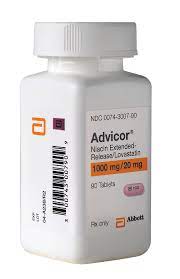Advicor
A prescription drug called Advicor is used to treat adults with high cholesterol. Niacin and lovastatin are the two medications included in Advicor.Vitamin B3 is another name for niacin. Mevacor® is another name for lovastatin.Your triglycerides (blood fat) and low-density lipoprotein (LDL) cholesterol (the "bad" cholesterol) may both decrease with the use of advice, while your HDL cholesterol (the "good" cholesterol) may increase.Advicor may aid in the prevention of certain types of heart surgery, heart attacks, and other cardiovascular diseases.Before you start taking Advicor and throughout treatment, your doctor should order blood tests to evaluate your liver's health.If you have liver issues, are pregnant, or are nursing, you should not take Advicor.Welzo users can use this article for informational purposes to better understand Advicor.

